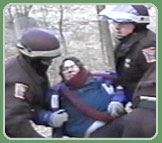 |
|
| Chapter 1: |
Final Hours of the Mendota Tree Sit |
 |
|
| In order to view the video or the stills you need to have RealPlayer installed. |
|
|
From wire services and Public Web Works Staff
Minneapolis, Dec. 11 -- Opponents of a controversial road project shouted
their defiance over the buzz of chain saws and logging equipment as workers
cut a swath through the trees and brush east of Hiawatha Avenue in South
Minneapolis.
About three dozen protesters were arrested in an early morning raid on
the site, where authorities found highway opponents gathered around a
campfire and camped in trees. It was the second such raid in less than a
year.
The Highway 55 reroute project will cut a four-lane bypass through an
old urban park just a few hundred yards from deeply wooded bluffs overlooking
the Mississippi River.
The protest was far less eventful than a confrontation months earlier in
which one protester was taken to the hospital. The conflict escalated that
day when authorities and tree removal specialist began sawing limbs off
trees which were occupied by protesters.
But on Dec. 11, the protesters were removed by a State Patrol
search-and-rescue squad in coveralls and full-body harnesses - but still
sporting their trademark maroon neckties. Troopers used a cherry picker,
and even a Minneapolis Fire Department ladder truck, to reach the protesters and
pull them from the trees.
Public Safety Department spokeswoman Cathy Clark said the troopers had
been training for just such an eventuality. Authorities, in fact, seemed to
have gone out of their way to prepare for the protesters: They met with them
and warned them of the raid earlier in the week. State Patrol Capt. Kevin
Kittridge even joined in an Indian pipe ceremony at the site last month.
All told, the protest and arrests went mostly without incident, or even
the rancor of the earlier confrontation.
Opponents were pained but unswayed as trees toppled. "I feel the
countrythat destroys its own soil destroys itself," said Courtney O'Connell from
Minneapolis, who sobbed each time a tree was felled. "I hope people get out
to vote. This is what happens when people don't."
At issue is a half-mile stretch of woods on public parkland just east of
the U.S. Bureau of Mines campus and south of East 54th Street. The Minnesota
55 reroute is slated to go right through the trees, several blocks east of
the present roadway.
Environmentalists oppose the project because it has leveled acres of
woods along the Mississippi River bluff. Opponents also say they fear the
road construction will destroy a natural spring which feeds the historic
Minnehaha Falls near the intersection of the Crosstown Highway and Hiawatha
Avenue.
Some native Americans opposed to the project contend that the site -
especially a stand of four bur oak trees - has been used for rituals since
before Fort Snelling was established in 1819.
"These trees are sacred," said Darlene Jackson, a member of the Leech
Lake band of Ojibwe, who joined in the singing at a final ceremony at the
site Saturday.
A study in April, however, found that the disputed land was probably too
low and damp to have served as a burial ground, and that the oak trees
likely date from the Civil War era. The Minnesota Department of Transportation -
the agency in charge of the project - also says that the new road will avoid the
so-called Coldwater Camp spring, which likely has some historical
significance.
Despite those assurances, members of the Mendota community gathered
among the trees and started singing and pounding a large drum well before 6 a.m.
All told, about 50 protesters gathered at the site, and about half of them
stayed until troopers and Hennepin County sheriff's deputies carried them
away.
Half a dozen or so others had climbed nearby trees, where they had tied
pallets, nets, ropes, hammocks, pails and tarps among the branches. They
vowed to camp there to keep the trees from being cut down.
Some supporters of the project were scattered quietly among the scores
of people watching as the trees were cut, pushed and mowed down for most of the
day.
"I'm just glad the project is moving ahead," said Rick Jesperson, who
lives a few blocks away. He grew up in the neighborhood and says he's been
concerned about rising traffic levels along Hiawatha and pollution that
congestion may bring.
"This has been a long time coming," he said.
|